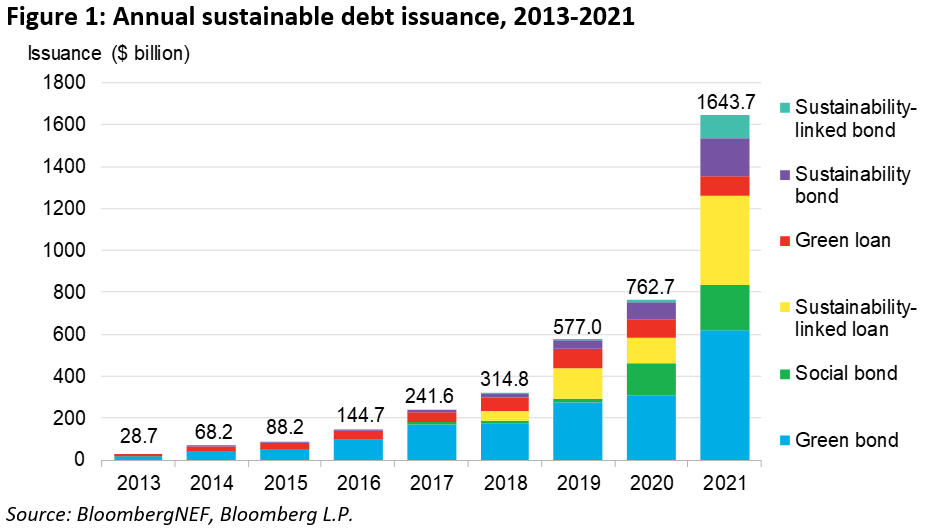According to BNEF, the fastest growth for sustainability themes in debt issuance last year came from sustainability-linked loans and bonds, which saw more than $530 billion issued in 2021 on their own, compared to only a quarter of this value in 2020. Most of them came from industries such as financials, consumer discretionary companies and utilities and their repayment is tied to the achievement of institutional environmental, social and governance targets, such as greenhouse gas emissions reductions.
“Sustainability-linked debt instruments are becoming more and more prevalent in today’s debt market because they allow enhanced flexibility – for better or worse – than strictly project-based borrowing for ESG purposes, Mallory Rutigliano, lead author of the report, said in a media statement. “Though they certainly may, bonds and loans don’t even need to be earmarked for specific purposes, which allows companies to integrate their corporate sustainability targets into all kinds of financing. As companies increasingly set these targets, sustainability-linked debt becomes more accessible.”

Rutigliano explained that in addition to sustainability-linked instruments, sustainable debt includes funds borrowed for specific ESG projects, such as renewable energy build.
“Green bonds, raised for environmentally beneficial activities, saw more than $620 billion in issuance in 2021,” she said. “Overall, green bonds are the largest contributor to the overall sustainable debt market, making up 45% of the $4 trillion of sustainable debt issued through 2021.”
The expert also mentioned that social and sustainability bonds, which finance social and community-based projects in full or combined with green objectives, rose to new heights as well, reaching nearly $400 billion in combined issuance in 2021.
“Though sustainable varieties still make up a relatively small portion of the total debt market, the $1.6 trillion in issuance in 2021 is similar to the 2020 GDP of Canada,” Maia Godemer, sustainable finance associate at BNEF, said in the press brief. “This is not insignificant, especially as more countries begin to legislate mandates and rules related to the scaling up and standardization of sustainable finance. This shows how much financing could be unlocked to expedite our transition to a low-carbon world.”
In Godemer’s view, regulators across the globe now face the challenges posed by sustainable debt’s rise.
“As investors, lenders and financial participants use ESG products with aplomb, governing bodies are tasked with defining what should and should not be included under these labels, the types of disclosure required and the ways to track and audit sustainability-related statements,” she said.




